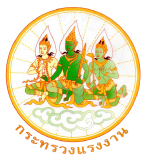Office of Labour Affairs in Malaysia has been informed by the Ministry of Foreign Affairs that the Brunei’s government plans to enforce the Syariah Penal Code and Civil Law in May 2014. Thai people, who wish to travel to work in the country, therefore, need to know about the laws.
Office of Labour Affairs in Malaysia has been informed by the Ministry of Foreign Affairs that the Brunei’s government plans to enforce the Syariah Penal Code and Civil Law in May 2014. Thai people, who wish to travel to work in the country, therefore, need to know about the laws.
The Syariah Penal Code lays out punishment for crimes prescribed by Al-Quran and by Prophet Muhammad, covering theft, robbing, causing physical hurt, illicit sexual relations, making unproven accusations of illicit sex, drinking intoxicants and acts contrary to Islamic beliefs. Punishment differs for each offense committed, ranging from amputation of hands and stoning to death. Prosecutors must fulfill a high burden of proof, including the testimony of at least four credible witnesses, in order to carry out the punishment. The law is confined to Muslims, but can be extended to non-Muslims if they are involved in aiding or abetting an offence committed by a Muslim.
There are two types of offence. Non-overlap offences are offences that have to be reviewed by only Islamic court, covering for example abandoning the religion, failure to worship on Friday, disrespecting the religion during Ramadan, promoting other religions and drinking intoxicants. An investigation will be carry out by Religious Enforcement Unit and the result will be presented to Syariah Chief Prosecutor at either Syariah Court or Syariah High Court for considertion.
The overlapping offences are offences that can be reviewed by either Syariah court or general court, covering, for example, theft, robbing, causing physical hurt. An investigation will begin with police and the result will be forwarded to a prosecutor. A special committee will be set up, consisting of a Syariah chief judge, a high court chief judge and other members who will jointly review if there are evidences as prescribed by the Syariah Penal Code. If there is, a Syariah prosecutor will take the case to the court; if there is not, a prosecutor will take the case to the court using the Civil Law.
The introduction of the the Syariah Penal Code has drawn criticism by the international community, especially those adhere to human rights. Brunei, however, believes the law will help reduce crimes. Thai workers in Brunei must be aware that althrough the law is confined to Muslims, it can be extended to non-Muslims if they are involved in aiding or abetting an offence committed by a Muslim.
Normal 0 false false false EN-US X-NONE TH /* Style Definitions */ table.MsoNormalTable {mso-style-name:”Table Normal”; mso-tstyle-rowband-size:0; mso-tstyle-colband-size:0; mso-style-noshow:yes; mso-style-priority:99; mso-style-parent:””; mso-padding-alt:0cm 5.4pt 0cm 5.4pt; mso-para-margin-top:0cm; mso-para-margin-right:0cm; mso-para-margin-bottom:10.0pt; mso-para-margin-left:0cm; line-height:115%; mso-pagination:widow-orphan; font-size:11.0pt; mso-bidi-font-size:14.0pt; font-family:”Calibri”,”sans-serif”; mso-ascii-font-family:Calibri; mso-ascii-theme-font:minor-latin; mso-hansi-font-family:Calibri; mso-hansi-theme-font:minor-latin; mso-bidi-font-family:”Cordia New”; mso-bidi-theme-font:minor-bidi;}




